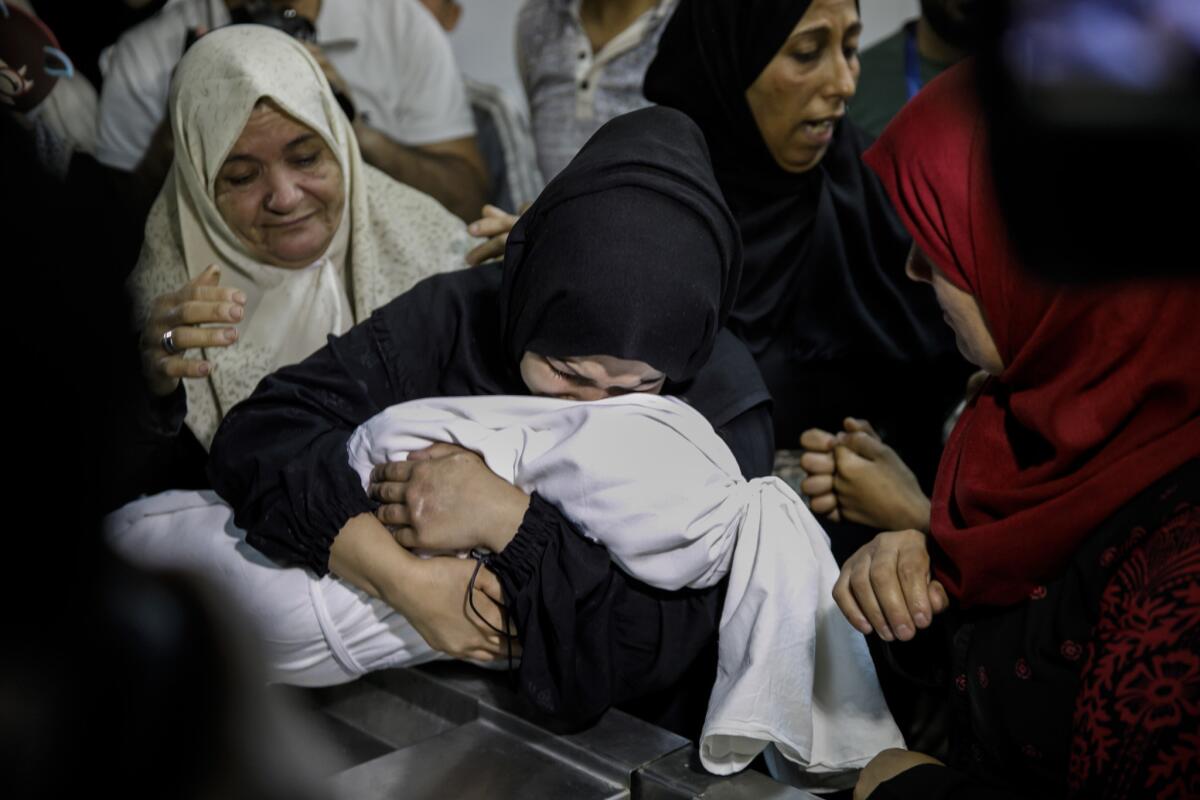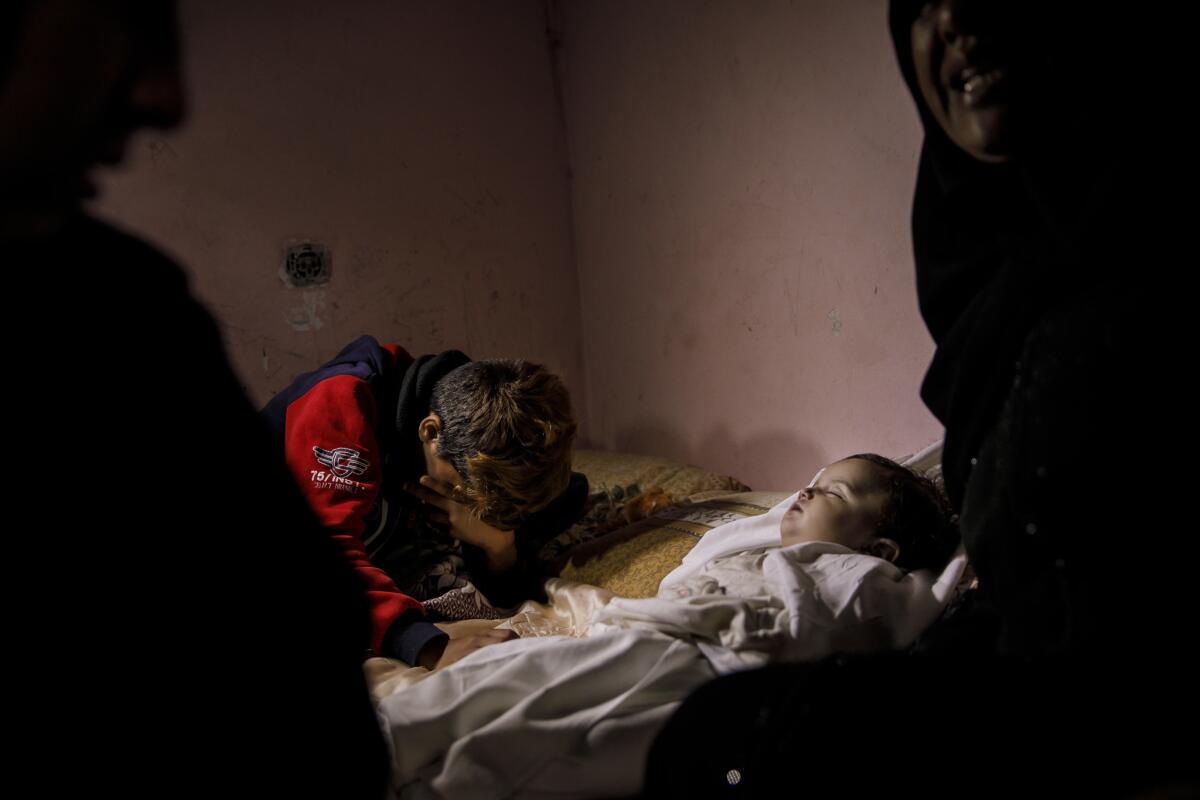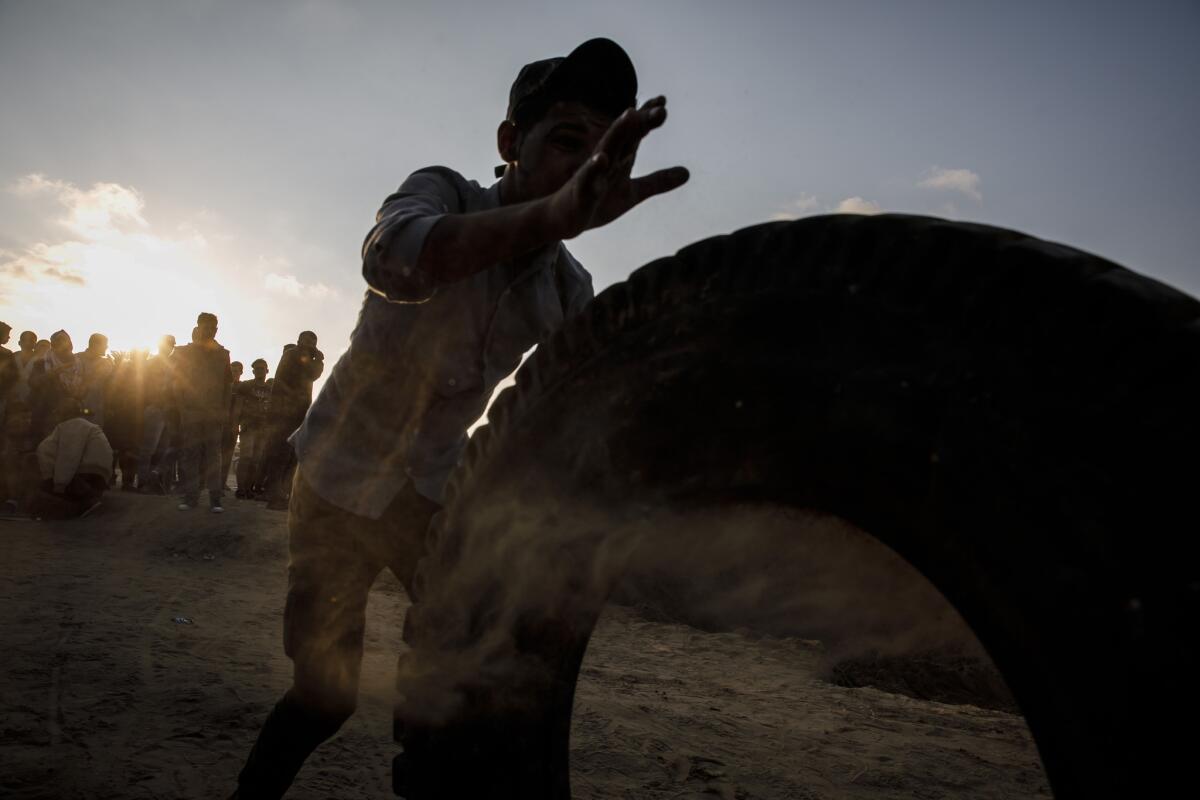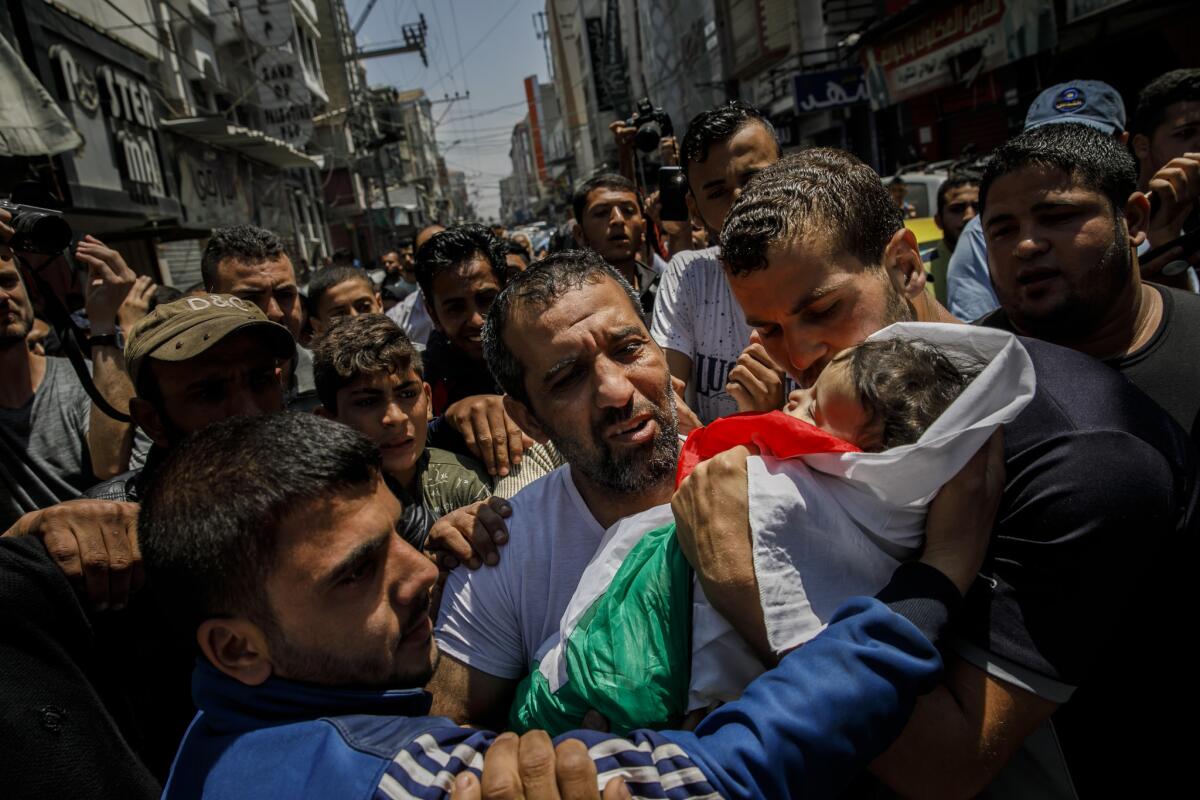Global Development: A baby girl dies in the haze of Gaza

- Share via
A skinny boy named Ammar, who is 12 but looks much younger, spent Monday playing with his sister’s 10-month-old daughter, Layla, at the cramped apartment where they both lived in the Gaza Strip.
When the blue-eyed infant seemed hungry, he shared a piece of flatbread with her.
His sister, he figured, was with other family members at the massive Palestinian protests demanding a right to return to their ancestral homeland.
He decided to go find them.
He carried Layla to a bus that was leaving from a nearby mosque for the encampment where the family had been stationing itself along the eastern border of Gaza during the weeks of demonstrations.
When Ammar Rezeq reached the camp, it was teeming with thousands of people, many of them threatening to storm security barriers and swarm into Israel. Israeli forces held them back with barrages of gunfire and tear gas. He made his way toward a security barrier, where his relatives usually gathered.
Suddenly he was surrounded by clouds of acrid white smoke. His niece began to cough.
“I put a scarf on my mouth and was trying to find my family,” Ammar recalled.
Finally, he found his mother and one of Layla’s aunts. They were shocked to see him appear through the haze, with the infant in his arms. The baby’s mother had never gone to the protests that day and stayed home to take a nap, they said.
The aunt took the baby from Ammar, and the three of them started running toward the bus. The girl’s hands were turning blue.
They thought she had fallen asleep on the bus, but when she wouldn’t wake up, they persuaded the driver to take them to a hospital.
Ammar watched as doctors desperately tried to revive the infant.
“I thought she would wake up,” he said, tears welling in his eyes.

By Tuesday, Layla Ghandour had made international news as a symbol of the Palestinian cause. The Gaza Health Ministry added her name to a list of protest martyrs — the youngest of more than 60 people who died on the bloodiest day of weeks of protests.
An Israeli military spokesman, Ofir Gendelman, challenged the family’s account, saying, “We have evidence casting doubt on the truthfulness of reports about the death of a baby girl in the Gaza Strip.” He did not elaborate.
A doctor at the hospital where Layla was treated said she had a preexisting heart condition that caused her death. He asked not to be identified because he was not authorized to discuss the child’s medical history.
Layla’s family and the Health Ministry acknowledged the medical issue, but said tear gas was a contributing factor in her death.
The clashes continued Tuesday as Palestinian officials reported at least two more fatalities near Gaza’s frontier with Israel, pushing the two-day death toll to 64.
Israel’s military also said scattered clashes broke out in the West Bank. It said 1,300 Palestinians participated in “violent riots” at 18 locations there Tuesday, with protesters burning tires and hurling rocks and firebombs at security forces.

The latest deaths came as Palestinians observed what they call the Nakba, or catastrophe, of their mass displacement 70 years ago during hostilities surrounding the creation of Israel.
Israeli officials maintain that live fire was used in response to a deadly threat posed by Palestinians seeking to breach the border fence with Gaza. The military said that at least 24 of those killed Monday were militants and that in the wake of Monday’s confrontation, its aircraft hit more than a dozen sites in Gaza that it described as “terror targets.”
In justifying its use of deadly force, Israel has cited firebombs thrown by protesters and flaming kites being flown across the frontier. The military said at least 400 protesters gathered Tuesday on the Gaza side and that several Palestinians were apprehended as they tried to breach a fence.
But international criticism of Israel has been growing.
In Geneva, U.N. human rights spokesman Rupert Colville denounced what he called the “appalling deadly violence” by Israeli forces. Ireland summoned the Israeli ambassador to urge restraint.
Turkey declared three days of official mourning, lowering flags to half-staff in a salute to slain Palestinians. With Turkey having temporarily expelled the Israeli ambassador in protest, Israel on Tuesday asked the Turkish consul general in Jerusalem to temporarily leave.
But at the United Nations, U.S. Ambassador Nikki Haley staunchly defended Israel, telling the Security Council that no member “would act with more restraint than Israel has” in the ongoing Gaza border confrontation.
Hamas political chief Ismail Haniyeh, however, denounced the “massacre” in Gaza, vowing to expand the confrontation with Israel.
On Tuesday, thousands of Palestinians staged angry funeral processions after midday prayers. They said their dead included eight children, a Hamas police officer and a double amputee who was photographed during the protests using a slingshot from his wheelchair.
Hundreds of mourners marched for Layla.
Her father, Anwar Ghandour, once eked out a living in tunnels along Gaza’s border with Egypt to smuggle in food, medicine, weapons, fuel and other goods. The tunnels were built after the Islamist militant group Hamas took over Gaza in 2007 and Israel, in a bid to protect itself, imposed a stifling embargo.
But Egypt destroyed most of them after President Abdel Fattah Sisi seized power from his Islamist predecessor, Mohamed Morsi.
Layla’s father hasn’t been able to find work since then — unemployment is nearly 50% in Gaza — and he struggles to provide for his family. A year ago, he and his wife lost a baby boy to the same heart condition that afflicted Layla. Relatives said he couldn’t afford to buy the recommended medicines.
At the time, the couple lived in a three-bedroom apartment with nine other members of his family. Furniture was sparse, because the family had to sell it to buy food and other necessities. Mold covered the hallways, and the smell of sewage could be overpowering.

Layla’s mother, Mariam Ghandour, 18, said she often argued with her husband because he could not afford to rent a home for them or provide food and diapers for his children. Around the time her son died, she moved back with her mother and grandmother.
The grandmother supported them from a stipend provided by the Palestinian Authority to the families of those killed in the wars with Israelis. Two of her sons died in previous hostilities. Fourteen people lived off this money, she said.
The power was out in the father’s apartment when he brought Layla’s body home from the hospital. Neighbors brought the family two buckets of water to wash her because the pipes had run dry. The women in the family placed the baby in a pink, plastic basin and gently scooped water over her head by the light of a cellphone.
The mother then wrapped Layla in a white shroud and a red, green, white and black Palestinian flag.
“Oh my beautiful daughter, I lost you,” she sobbed, holding the tiny bundle tightly to her chest. “She is all I have.”
Shortly before the call to prayers sounded, the father took Layla to mosque to pray over her body. He and other family members took turns carrying her on the march from the mosque to a nearby cemetery, past shops shuttered because Hamas had called for a general strike.
As mourners lowered the body into the sandy ground, a wail echoed across ancient tombstones.
“I want to see her one last time,” her mother pleaded.
“It’s God’s will,” the men told her as they shooed her away.
“Have faith in God.”
Twitter: @alexzavis
Salah is a special correspondent. Times staff writer Laura King in Amsterdam and special correspondent Noga Tarnopolsky in Ramallah, West Bank, contributed to this report.
Sign up for Essential California
The most important California stories and recommendations in your inbox every morning.
You may occasionally receive promotional content from the Los Angeles Times.








